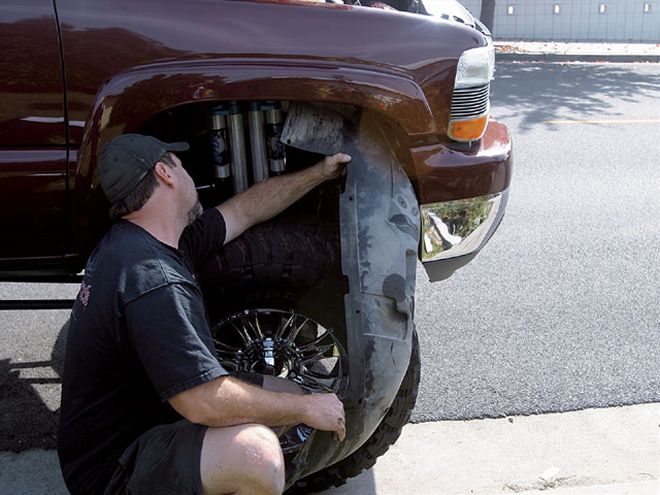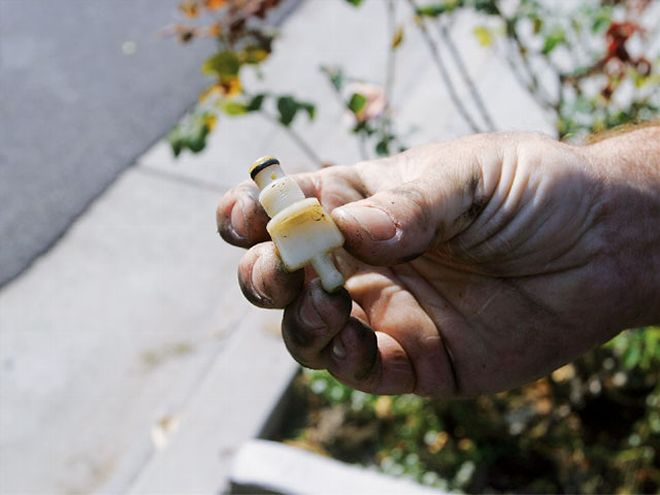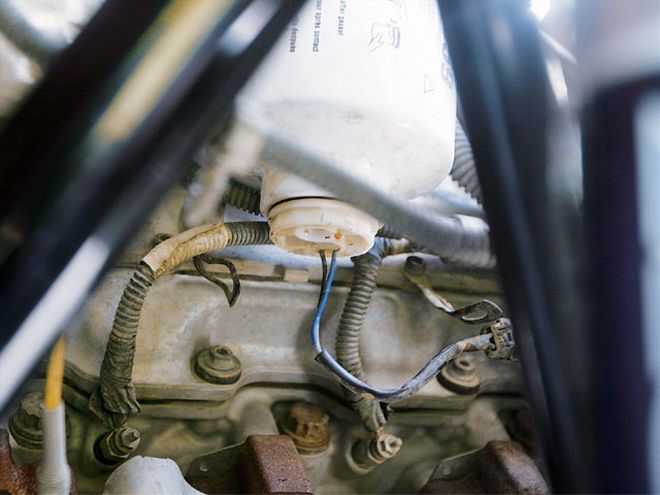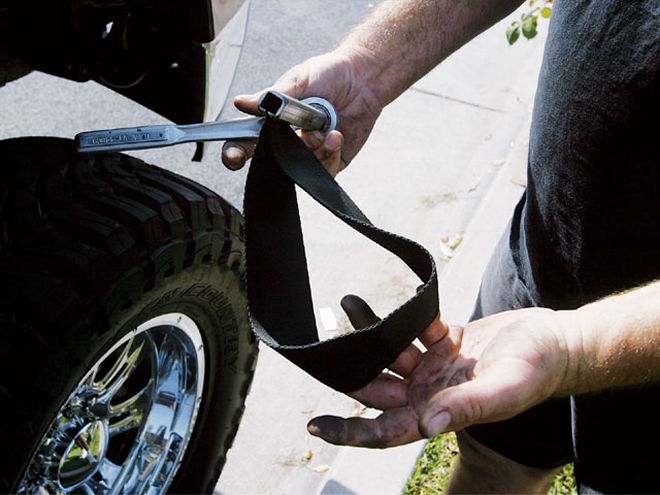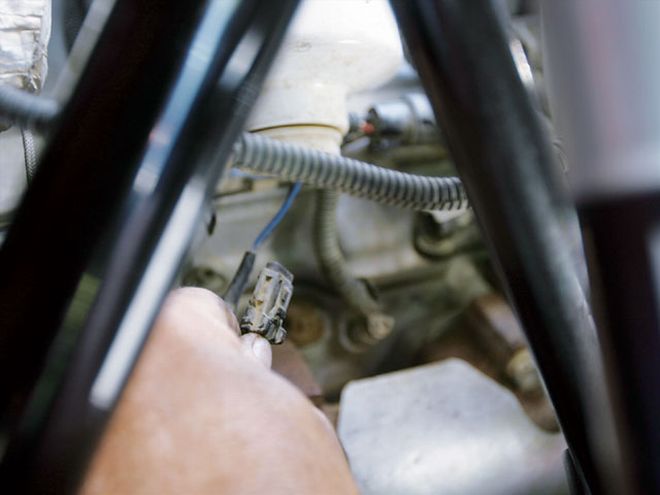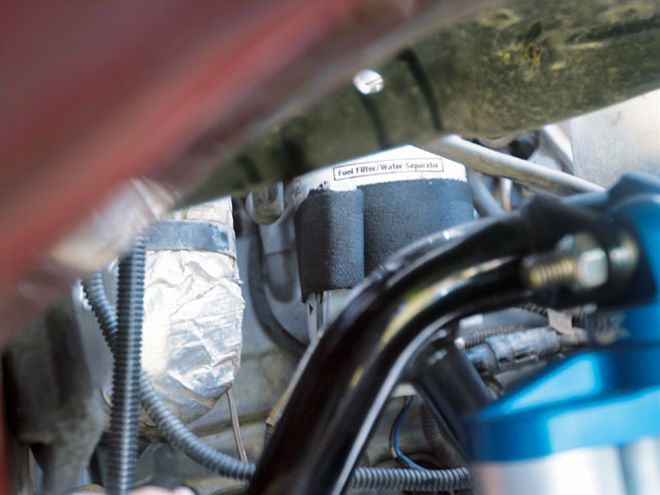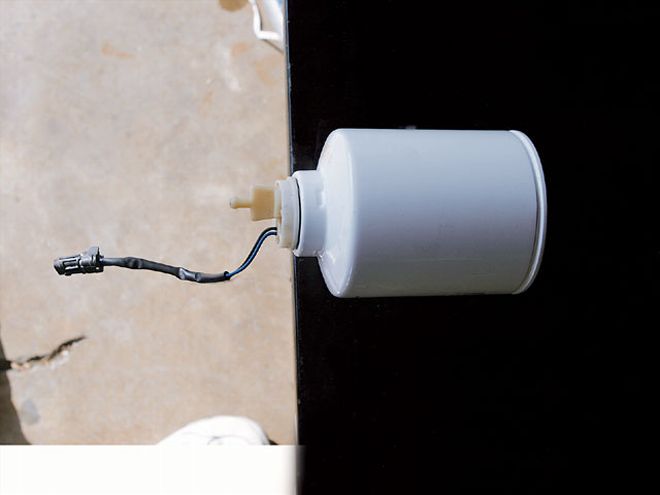
| gm Fuel Filter filter
Ok, so the buzz words Cummins, Power Stroke, and Duramax got you to pony up the extra ducats to power your new hauler with a diesel engine. Like most people, change doesn't come easy, so the warranty is justification for taking your oil-burner to the dealer for all the standard maintenance. You did the basic maintenance on your gas hauler, because your pops showed you how it was done and what was what, back in the day.
So, why would a diesel be different from any other combustion engine you own? Trust us when we say, the dealer loves to change your oil for $70 a pop. No Lube comes to mind every time we hear stories about dealers gouging the pocketbooks of timid do-it-yourselfers. Your local Auto Zone sells an oil filter for $3.79 and three gallons of Rotella at $7.80 a gallon, which will save you $40. That's a lot of gas money lost, just to have some snot-nose kid working as a lube tech change the oil in your truck.
We were shocked at what our local GM dealer had to say when we asked, "At what intervals should the engine oil be changed?" The answer was that the engine had a viscosity sensor, and the truck would let you know when it needed to be changed. Oh yeah? Well, we could use your bumper as a parking feeler to let us know when we are too close to another vehicle, but we won't be doing that either. As you know, the engine's exhaust flows over the turbine wheel, which spins the compressor wheel, forcing air into the intake. Under load, the exhaust temperature can be as hot as 14,000 degrees Fahrenheit. At the engine's higher rpm, a turbocharger can spin the turbine shaft at speeds of as much as 120,000 rpm. That's a lot of heat!
Some would argue that turbochargers don't make heat, but they absorb it and use it to make power. The people that think a turbo doesn't create heat should rub their hands together in a small circle at 120,000 rpm, with 22 pounds of force pushing them together, while pouring 300-degree, carbon-impregnated oil over their hands. Comparing steel and cast-iron to skin isn't quite like comparing apples to apples, but both steel and cast-iron are effected by the aforementioned temperatures, especially when you're referring to a thin turbine blade subjected to exhaust heat, mounted 15 inches from the cylinder head.
Basically, it's good to be religious about fluid and filter changes, when it comes to getting maximum life and performance from any engine. This statement is very true with diesel fuel. Even though fuel manufacturers have deemed diesel prices should be close, if not higher, to premium gas, it's still the dirtiest fuel you can purchase from the pump. Diesel fuel has water in it that creates problems with the fuel.
First off, diesel will absorb water, so in any situation where the fuel tank will condensate, the condensation is added to the fuel. Water/methanol injection is good, but this isn't how it's done, so the added moisture in the fuel is bad. Secondly, water in diesel will turn any small metal particle to a clump of rust, introducing really bad impurities to the fuel system. These particles can clog the injector. With fuel pressure in the 23,000-psi range, the tip of the injector will blow off, introducing a small metal particle to the cylinder. When the cylinder pressure ignites fuel of the no-tip injector, it becomes a torch that will burn a hole through the piston and distort the cylinder wall. Lastly, the excess water will actually grow fungus, and we don't need to explain why that's bad, right? So, next time you spend more than $3 a gallon on fuel, keep in mind that your money is also paying for all the crap that grows in it.
But, don't worry. Your diesel engine has provisions to separate and filtrate the moisture and impurities in the fuel. In this case, the GM Duramax uses a filter that has two sensors running to it. The first reads the fuel's temperature and will heat the fuel up to 58 degrees for cold start, should you live in a cold climate. The second signifies when it's time to open the petcock on the filter, and drain the separator of its captured water. Follow along as we demonstrate the ins and outs of the GM fuel filter maintenance process.
 | gm Fuel Filter filter
Ok, so the buzz words Cummins, Power Stroke, and Duramax got you to pony up the extra ducats to power your new hauler with a diesel engine. Like most people, change doesn't come easy, so the warranty is justification for taking your oil-burner to the dealer for all the standard maintenance. You did the basic maintenance on your gas hauler, because your pops showed you how it was done and what was what, back in the day.
So, why would a diesel be different from any other combustion engine you own? Trust us when we say, the dealer loves to change your oil for $70 a pop. No Lube comes to mind every time we hear stories about dealers gouging the pocketbooks of timid do-it-yourselfers. Your local Auto Zone sells an oil filter for $3.79 and three gallons of Rotella at $7.80 a gallon, which will save you $40. That's a lot of gas money lost, just to have some snot-nose kid working as a lube tech change the oil in your truck.
We were shocked at what our local GM dealer had to say when we asked, "At what intervals should the engine oil be changed?" The answer was that the engine had a viscosity sensor, and the truck would let you know when it needed to be changed. Oh yeah? Well, we could use your bumper as a parking feeler to let us know when we are too close to another vehicle, but we won't be doing that either. As you know, the engine's exhaust flows over the turbine wheel, which spins the compressor wheel, forcing air into the intake. Under load, the exhaust temperature can be as hot as 14,000 degrees Fahrenheit. At the engine's higher rpm, a turbocharger can spin the turbine shaft at speeds of as much as 120,000 rpm. That's a lot of heat!
Some would argue that turbochargers don't make heat, but they absorb it and use it to make power. The people that think a turbo doesn't create heat should rub their hands together in a small circle at 120,000 rpm, with 22 pounds of force pushing them together, while pouring 300-degree, carbon-impregnated oil over their hands. Comparing steel and cast-iron to skin isn't quite like comparing apples to apples, but both steel and cast-iron are effected by the aforementioned temperatures, especially when you're referring to a thin turbine blade subjected to exhaust heat, mounted 15 inches from the cylinder head.
Basically, it's good to be religious about fluid and filter changes, when it comes to getting maximum life and performance from any engine. This statement is very true with diesel fuel. Even though fuel manufacturers have deemed diesel prices should be close, if not higher, to premium gas, it's still the dirtiest fuel you can purchase from the pump. Diesel fuel has water in it that creates problems with the fuel.
First off, diesel will absorb water, so in any situation where the fuel tank will condensate, the condensation is added to the fuel. Water/methanol injection is good, but this isn't how it's done, so the added moisture in the fuel is bad. Secondly, water in diesel will turn any small metal particle to a clump of rust, introducing really bad impurities to the fuel system. These particles can clog the injector. With fuel pressure in the 23,000-psi range, the tip of the injector will blow off, introducing a small metal particle to the cylinder. When the cylinder pressure ignites fuel of the no-tip injector, it becomes a torch that will burn a hole through the piston and distort the cylinder wall. Lastly, the excess water will actually grow fungus, and we don't need to explain why that's bad, right? So, next time you spend more than $3 a gallon on fuel, keep in mind that your money is also paying for all the crap that grows in it.
But, don't worry. Your diesel engine has provisions to separate and filtrate the moisture and impurities in the fuel. In this case, the GM Duramax uses a filter that has two sensors running to it. The first reads the fuel's temperature and will heat the fuel up to 58 degrees for cold start, should you live in a cold climate. The second signifies when it's time to open the petcock on the filter, and drain the separator of its captured water. Follow along as we demonstrate the ins and outs of the GM fuel filter maintenance process.
| gm Fuel Filter filter
Ok, so the buzz words Cummins, Power Stroke, and Duramax got you to pony up the extra ducats to power your new hauler with a diesel engine. Like most people, change doesn't come easy, so the warranty is justification for taking your oil-burner to the dealer for all the standard maintenance. You did the basic maintenance on your gas hauler, because your pops showed you how it was done and what was what, back in the day.
So, why would a diesel be different from any other combustion engine you own? Trust us when we say, the dealer loves to change your oil for $70 a pop. No Lube comes to mind every time we hear stories about dealers gouging the pocketbooks of timid do-it-yourselfers. Your local Auto Zone sells an oil filter for $3.79 and three gallons of Rotella at $7.80 a gallon, which will save you $40. That's a lot of gas money lost, just to have some snot-nose kid working as a lube tech change the oil in your truck.
We were shocked at what our local GM dealer had to say when we asked, "At what intervals should the engine oil be changed?" The answer was that the engine had a viscosity sensor, and the truck would let you know when it needed to be changed. Oh yeah? Well, we could use your bumper as a parking feeler to let us know when we are too close to another vehicle, but we won't be doing that either. As you know, the engine's exhaust flows over the turbine wheel, which spins the compressor wheel, forcing air into the intake. Under load, the exhaust temperature can be as hot as 14,000 degrees Fahrenheit. At the engine's higher rpm, a turbocharger can spin the turbine shaft at speeds of as much as 120,000 rpm. That's a lot of heat!
Some would argue that turbochargers don't make heat, but they absorb it and use it to make power. The people that think a turbo doesn't create heat should rub their hands together in a small circle at 120,000 rpm, with 22 pounds of force pushing them together, while pouring 300-degree, carbon-impregnated oil over their hands. Comparing steel and cast-iron to skin isn't quite like comparing apples to apples, but both steel and cast-iron are effected by the aforementioned temperatures, especially when you're referring to a thin turbine blade subjected to exhaust heat, mounted 15 inches from the cylinder head.
Basically, it's good to be religious about fluid and filter changes, when it comes to getting maximum life and performance from any engine. This statement is very true with diesel fuel. Even though fuel manufacturers have deemed diesel prices should be close, if not higher, to premium gas, it's still the dirtiest fuel you can purchase from the pump. Diesel fuel has water in it that creates problems with the fuel.
First off, diesel will absorb water, so in any situation where the fuel tank will condensate, the condensation is added to the fuel. Water/methanol injection is good, but this isn't how it's done, so the added moisture in the fuel is bad. Secondly, water in diesel will turn any small metal particle to a clump of rust, introducing really bad impurities to the fuel system. These particles can clog the injector. With fuel pressure in the 23,000-psi range, the tip of the injector will blow off, introducing a small metal particle to the cylinder. When the cylinder pressure ignites fuel of the no-tip injector, it becomes a torch that will burn a hole through the piston and distort the cylinder wall. Lastly, the excess water will actually grow fungus, and we don't need to explain why that's bad, right? So, next time you spend more than $3 a gallon on fuel, keep in mind that your money is also paying for all the crap that grows in it.
But, don't worry. Your diesel engine has provisions to separate and filtrate the moisture and impurities in the fuel. In this case, the GM Duramax uses a filter that has two sensors running to it. The first reads the fuel's temperature and will heat the fuel up to 58 degrees for cold start, should you live in a cold climate. The second signifies when it's time to open the petcock on the filter, and drain the separator of its captured water. Follow along as we demonstrate the ins and outs of the GM fuel filter maintenance process.
